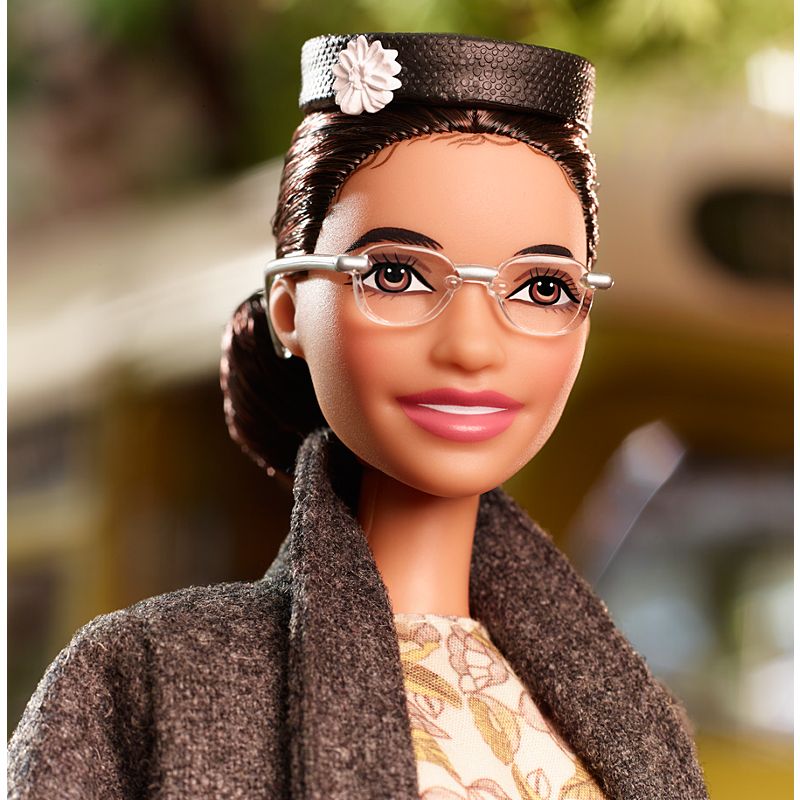Mattel released a Barbie doll in honor of Rosa Parks. But they got her story wrong. Join us in telling Mattel to correct the story and accessories they’re providing with their Rosa Parks doll.
John,
Earlier this week, Mattel released a Barbie doll in honor of Mrs. Rosa Parks — a touching tribute to a civil rights icon. Sadly, Mattel got Rosa Parks’ story wrong, and we think they should fix it.
Splashed across the doll’s packaging and on their site, Mattel has reduced Rosa Parks’ decades of activism into a single moment, saying she “led an ordinary life as a seamstress” until an “extraordinary moment on December 1, 1955.”1 But Rosa Parks was far from ordinary. As documented by Jeanne Theoharis in The Rebellious Life of Mrs. Rosa Parks, she was a leader in her community, an organizer, and a tireless fighter for the rights of her people. She fought for justice for Black women who were victims of sexual violence. She pushed for voter registration for Black people. She pressed for the desegregation of schools and public spaces.2 We cannot allow Mattel to rewrite her story and minimize her life’s work.
Rosa Parks’ refusal to give up her seat on the bus to a white passenger was a strategic decision made by Black women who spent decades fighting for civil rights in the segregated South. She made extreme personal sacrifices that continue to go unacknowledged to this day. But Mrs. Parks still decided to remain seated that day, because she knew that change requires courage, resolve, and perseverance.
Adjusting the language for Rosa Parks’ Barbie is crucial. Dolls are one of the first toys a child interacts with that allows a child to begin to understand who they are, and start to imagine who they can be. They have the power to represent culture and help a child understand their racial identity. Barbie has a large role in this; Mattel and Barbie have been pivotal in helping children begin to understand themselves, understand their creativity and self-expression, and dream up goals and career paths.3 When a Black doll — particularly one based on a real person — does not have a full, multidimensional story, it means the children who play with it lose a powerful opportunity to imagine themselves accomplishing their greatest dreams. It is necessary to tell Rosa Parks’ full story to avoid sending a limited to message to Black children that their own stories — their history — are not worth being told.
Far too often, Black women’s stories are revised or minimized for the white gaze. Much like the work of Mrs. Parks, our work is reduced to one moment, something “extraordinary, ” or a stroke of luck. In reality, Black women have worked throughout history in order to make the world a better place for all of the people who live in it. Our activism is not luck. Our successes are the result of perseverance, resilience, and hard work. This kind of whitewashing of history diminishes Black people’s pivotal role in this country’s story as organizers, agents of social change, cultural contributors and powerful intellectuals. In a time when white supremacy dominates the culture of this country, this kind of erasure is not just wrong, it’s dangerous.
Until justice is real,
—Arisha, Rashad, Brandi, Johnny, Future, Samantha, Evan, Eesha, Marcus, FolaSade, and the rest of the Color Of Change team
References:
- “Rosa Parks Barbie® Inspiring Women™ Doll,” Barbie.com, https://act.colorofchange.org/go/178713?t=8&akid=35428%2E4731121%2EnaCZb4
- “How history got the Rosa Parks story wrong,” Washington Post, December 1, 2015, https://act.colorofchange.org/go/178715?t=10&akid=35428%2E4731121%2EnaCZb4
- “The Significance and Impact of Barbie Dolls in Shaping the Personality of your Child,” Medium, September 29, 2015, https://act.colorofchange.org/go/178717?t=12&akid=35428%2E4731121%2EnaCZb4
Photo: Barbie.com

Color Of Change is building a movement to elevate the voices of Black folks and our allies, and win real social and political change. Help keep our movement strong.
If you're absolutely sure you don't want to hear from Color Of Change again, click here to unsubscribe.